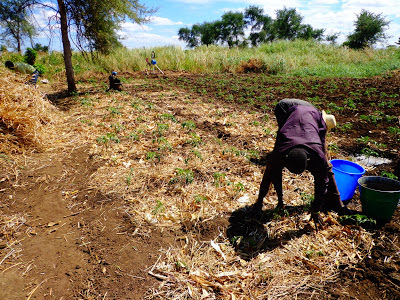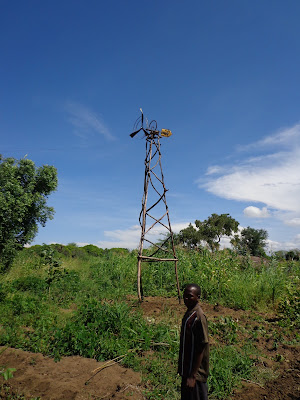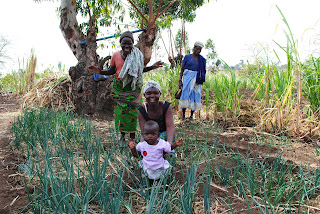Though they said they had some challenges at first, the irrigation process has not been difficult for them. They were excited to share with us their plans for expansion.
Showing posts with label water. Show all posts
Showing posts with label water. Show all posts
Thursday, May 9, 2013
First Roots in the Ground at Siyasiya, Salima
Farmers were busy in their irrigated gardens the past three weeks, putting to practice what they learned during the initial trainings in April. At Salima, the St. Barnabas irrigation club transplanted tomato seedlings into the first section of their garden.
Though they said they had some challenges at first, the irrigation process has not been difficult for them. They were excited to share with us their plans for expansion.
Though they said they had some challenges at first, the irrigation process has not been difficult for them. They were excited to share with us their plans for expansion.
Labels:
Africa,
agriculture,
compost,
conservation agriculture,
ECHO,
Farming,
food,
health,
hunger,
irrigation,
Maize,
Malawi,
teaching,
Villages,
water
Tuesday, April 16, 2013
Getting Ready For Growth
The Mziza Farming Club is getting into irrigation as early as possible this season. On Monday this week, we delivered farm inputs which the farmers accessed through a revolving fund for input loans.
In order to access the loan, a farmer was required to participate in irrigation training and plant at least two season under the new irrigation techniques. Farmers who proved that they could be successful irrigation farmers could then apply to receive inputs to expand the size of their irrigated gardens.
Each member will pay back the loan over two consecutive planting cycles this season. In this way, the loss of capital incurred by paying back the loan is mitigated by the extra income of the second planting. In other words, with two planting cycles it is easier to balance the crop yield between: 1) paying back the loan, 2) eating a balanced diet at home, and 3) using income for other purposes (e.g. paying school fees).
Saturday, March 2, 2013
Local Design Windmill
On the return journey of a recent field trip to irrigation sites in the Malawian lakeshore district Salima, we practically stumbled upon a local windmill. Tucked behind an acacia grove, so invisible to the many cyclists and motorists passing by, a recent high school graduate had been busy making his dream machine: a windmill generator/water pump.
He had heard we passed by on our way to the field and waited by the roadside four hours until we returned. Before we could get back on the tarmac and drive away oblivious to his invention, he flagged us down and directed us to his home and the 30' tower made from eucalyptus globulus (blue gum) poles.
While the unit did not generate electricity yet, he was preparing to mount a bicycle dynamo to the wheel. We gave him some pointers to help him understand what was happening. He could really understand the kind of power he was looking for and how his design might not work.
Before leaving we gave the best encouragement we could, don't give up, etc., (knowing that this kid probably didn't need any more encouragement than his own ambition). In the car again, we discussed what we could do to help. We came up with a few designs we could build in the workshop and bring back to show him next month. Of course we hope he will also have some improvements by then.
These gems are found throughout the world if only we could find them all!
He had heard we passed by on our way to the field and waited by the roadside four hours until we returned. Before we could get back on the tarmac and drive away oblivious to his invention, he flagged us down and directed us to his home and the 30' tower made from eucalyptus globulus (blue gum) poles.
While the unit did not generate electricity yet, he was preparing to mount a bicycle dynamo to the wheel. We gave him some pointers to help him understand what was happening. He could really understand the kind of power he was looking for and how his design might not work.
Before leaving we gave the best encouragement we could, don't give up, etc., (knowing that this kid probably didn't need any more encouragement than his own ambition). In the car again, we discussed what we could do to help. We came up with a few designs we could build in the workshop and bring back to show him next month. Of course we hope he will also have some improvements by then.
These gems are found throughout the world if only we could find them all!
Tuesday, February 12, 2013
Mzindo Irrigation
It
had just stopped raining in Mzindo families run to the village
headman house to hold a meeting with him. The ten families remain
standing waiting for traditional leader to come out. He comes out,
and finds people with clothes dripping. One representative tells the
chief about the irrigation farming. The farmers did not know that AWP
had already met him to discuss irrigation farming in the area.
Later
that day, AWP starts off on the 30 km drive to Mzindo village to hold
the first meeting with farmers interested to participate in
irrigation farming. AWP finds farmers sitting around a big tree with
a big canopy that provides good shade to children, mothers, fathers
and the aged. During the day, most people would converge around these
trees to relax after working in the crop fields; play Bawo;
listen to cases; attend village meetings; watch traditional dances
like gule wamkulu and
any other traditional activity.
This
day, only adults sit around to hear what AWP has brought to the
village. Children play in the tall grass nearby. The meeting begins
with introductions and finishes with AWP telling farmers about
sustainable irrigation farming and the water pumps that would help
them to have improved crop yield each irrigation season. AWP asks the
farmers for their commitment to an irrigation project in the area.
This sends farmers into hand clapping and ululations.
One
farmer rises up and tells AWP how they have had problems using
watering cans to irrigate the crops; the activity of drawing water
alone is tiresome as compared to the irrigation technology they saw
in Mziza village, not far from their village. This farmer finishes by
saying the introduction of hand cranked and pedal pumps for
irrigation farming will help them to harvest more food in a year. The
farmers want to be the beginners in learning the new concept of
farming.
The
meeting ends with a visit to a new site where the village headman has
offered land for establishing an irrigation garden for other farmers
within and the neighboring villages.
Monday, January 7, 2013
Guest Blogger Today
Guest Blogger Jessica Irvin from Defending the Fatherless guest blogs today. She and her family support Africa Windmill Project in many of ways.
As the 2012 Christmas season fades into another year of memories, I continue to be bothered by a brief, 6 or 7 second news clip that my husband and I saw late one night in early December.
By most accounts, it was a heart warming moment-the result of one women’s kindness to a child—a child she would never meet, but was thoughtful enough to consider. We’ve seen it played out before, probably participated in a similar activity at one time or another. And, please don’t misunderstand my point-this woman was doing nothing wrong-in fact she was doing everything right by our cultural standards and norms. Yet, the words that she spoke have stuck with me in a way that I can only describe as nails on a chalk board. It stopped me in my tracks.
The scene was of a jolly middle aged woman, hands full of shopping bags loaded with Christmas treasures, happily donating a gift to a child via a local charity who may otherwise not receive a gift on Christmas morning. The phrase that made my heart beat a little faster, “It feels good to give to a child in need.”
Seems harmless enough and it’s true. It does feel good to give to someone in “need.”
What got me is that we had just returned home a few weeks prior to viewing this clip with our little son from Ethiopia, once in “need” of a family and now forever in our arms.
I had just witnessed NEED beyond understanding. True need—like for the basics—for things like water that doesn’t cause illness, food that satisfies a hunger that has often been growing for days, clothing and shelter and access to basic medical care to treat diseases easily treated here that devastate whole nations across the world-need for the things that so many of us (myself included) so often take for granted.
I looked at my husband and said, “We think toys are a NEED in America.”
We bought (literally) into this myth somewhat as each of our children received a couple of new items this Christmas, and with the exception of the toothpaste in their stockings (and I suppose one could make a case for whether or not that is truly a need), none of the new items were necessary for their health, well being or physical development. None of the items sustained life or gave life. None of the items had the potential to impact families or even whole communities.
Just as the Father loves to give good gifts to his children, we too enjoy seeing the faces of our children light up when presented with a gift. I’m not trying to take away from that, but to instead call to our attention that others suffer when we chose to add to our excess instead of, as the bible commands, share with God’s people who are in need (Romans 12:13).
And there are so many around the world in true need of the most basic resources, with probably the most important of these being clean water.
When I return home from Africa, I’m always a bit shell shocked upon reentry. I always say it is harder to return home than to return to Africa. I catch myself thinking thoughts like, “the water I shower with is cleaner than what they have to drink” or “I wash my clothes (well, technically the machine does) in cleaner water than they have available for cooking” or “I simply turn on one of my six faucets and clean water pours out while they hike 6 miles a day to the nearest water source.” And, none of it can be reconciled in my head except if I am willing to do something to make a difference.
I have seen first hand how life changing access to clean water is for a child, a family, and for entire communities.
Africa Windmill Project (AWP) works along side the people of Malawi to equip them to make these changes available to them. By educating and supporting rural farmers on how to irrigate crops via simple and affordable water pumps, Malawians are able to work to feed and care for their families. AWP also works to educate and train the local people on how to maintain clean drinking water, sustainable agriculture practices, and community development-all with the focus of Malawians being self-sufficient and duplicating the model within their own country.
Now, that’s something to feel good about.
To learn more about or partner with AWP as they help empower the people of Malawi to meet their NEEDS, please visit Africa Windmill Project.
Give, and it will be given to you. A good measure, pressed down, shaken together and running over, will be poured into your lap. For with the measure you use, it will be measured to you." Luke 6:38
Thursday, November 3, 2011
AWP Manual/Pedal Water Pump
This is Post No. 1 in a series of 5; each post deals with the particulars of our projects. These posts are designed to give more information about the technologies and techniques AWP is promoting.
1. AWP Manual/Pedal Water Pump
2. AWP Windmill Water Pump
3. Basin Irrigation
4. Conservation Techniques
5. Solar Water Heater
As the user rotates the crank (hand crank in the first two photos or bicycle crank in the third photo above), the tyre-pulley spins. The rope is pulled by the tyre-pulley, through the pipe (40mm diameter), down into the water, and back up the pipe. As the washers tied along the rope pass through the water, they lift water up and out of the pipe. This happens many times per second, and a large volume of water flows through the pump. Water flowing from the pipe falls into a 25 liter plastic container, which funnels the water into a larger diameter (50mm to 63mm). Finally, the water exits the pump into a stilling basin at the top of the irrigated garden.
The manual/pedal pump is very effective and can irrigation a substantial garden. Compared to a treadle pump, the manual/pedal pump is superior by every measure.
1. AWP Manual/Pedal Water Pump
2. AWP Windmill Water Pump
3. Basin Irrigation
4. Conservation Techniques
5. Solar Water Heater
1. AWP Manual/Pedal Water Pump
Africa Windmill Project has the goal to bring sustainable irrigation systems to the hands of smallholders, farmers who wish to irrigate 1.0Ha (2.5 acres) or less.
The first development towards this goal is moving from watering cans to a positive displacement pump. The water pump that AWP promotes is a rope-and-washer pump operated by hand or foot.
As the user rotates the crank (hand crank in the first two photos or bicycle crank in the third photo above), the tyre-pulley spins. The rope is pulled by the tyre-pulley, through the pipe (40mm diameter), down into the water, and back up the pipe. As the washers tied along the rope pass through the water, they lift water up and out of the pipe. This happens many times per second, and a large volume of water flows through the pump. Water flowing from the pipe falls into a 25 liter plastic container, which funnels the water into a larger diameter (50mm to 63mm). Finally, the water exits the pump into a stilling basin at the top of the irrigated garden.
The manual/pedal pump is very effective and can irrigation a substantial garden. Compared to a treadle pump, the manual/pedal pump is superior by every measure.
The cost of the pump is within range of most smallholders and can be earned back in one growing season. Farmers can be trained to build and maintain the pumps themselves, so there is little need for skilled technicians to install or repair pumps. Materials for the pump can be found and purchased in any district of Malawi.
For more information contact Africa Windmill Project through our website: CONTACT US.
Labels:
Africa,
design,
Farming,
health,
hunger,
irrigation,
Malawi,
need,
rope and washer pump,
starvation,
Villages,
water,
windmill
Thursday, October 13, 2011
Subscribe to:
Posts (Atom)











.JPG)



















